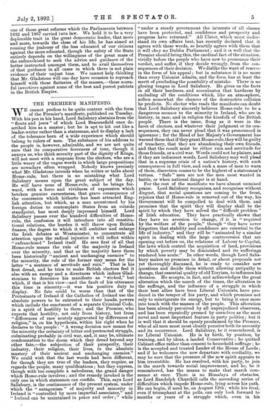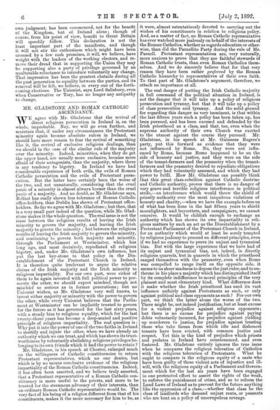THE PREMIER'S MANIFESTO.
WE cannot profess to be quite content with the form of the Premier's manifesto, published on Tuesday. With his pen in his hand, Lord Salisbury abstains from the "flouts and jeers" of which Lord Beaconsfield once de- scribed him as a master ; but he is apt to hit out like a leader-writer rather than a statesman, and to display a lack of the tolerance born of a wide experience which should belong to rulers of men. The substance of his address to the people is, however, admirable, and we are not quite sure that its comparative fierceness of tone, though it annoys us, who think serenity part of the dignity of Kings, will not meet with a response from the electors, who are a little weary of the vague words in which large propositions are nowadays often wrapped. Nobody knows precisely what Mr. Gladstone intends when he writes or talks about Home-rule, but there is no mistaking what Lord Salisbury means upon the great subject of the day. He will have none of Home-rule, and he brings for- ward, with a force and vividness of expression which betoken genuine earnestness, that grave consequence of the concession which hitherto has least attracted Eng- lish attention, but which, as a man accustomed by his foreign duties to contemplate States from an outside standpoint, has most deeply impressed himself. Lord Salisbury passes over the hundred difficulties of Home- rule, the confusion it will introduce• into all constitu- tional relations, the burden it will throw upon British finance, the degree to which it will embitter and. enlarge the Irish debates at Westminster, to concentrate all attention upon the radical injustice it will inflict within " enfranchised " Ireland. itself. He sees first of all that Home-rule means the rule of the majority in Ireland over the minority, and that as the majority have there been historically "ancient and unchanging enemies" to the minority, the rule of the former may mean for the latter "a sentence of servitude and. ruin." That is his first dread, and he tries to make British electors feel it also with an energy and a directness which induce Glad- stonians to denounce his manifesto as "wicked," but which, if that is his view—and the fault of his utterance this time is sincerity—it was his positive duty to display. No fate could be worse than that of the Protestants of Ireland if the Catholics of Ireland use the absolute powers to be entrusted. to their hands, powers which include the enactment of a separate Criminal Code, in a spirit of hostility to them ; and. the Premier, who expects that hostility, not only from history, but from "differences of race acutely aggravated by differences of religion," is, on his hypothesis, within his right when he declares to the people : "A wrong decision now means for the minority the certainty of bitter and. protracted struggle, culminating probably in civil war, and, it may be, ultimate condemnation to the doom • which they dread beyond any other fate,—the subjection of their prosperity, their industry, their religion, their lives, to the absolute mastery of their ancient and. unchanging enemies." We could wish that the last words had been different, for though they are true of the leaders, they require, as regards the people, many qualifications ; but they express, though with too complete a nakedness, the grand danger which Home-rule involves ; and the remedy invoked is the only one in which statesmen can confide. This, says Lord Salisbury, is the continuance of the present system, under which the " antagonism " of majority and. minority in Ireland is "controlled. by more impartial associates," and "Ireland can be maintained in peace and order ; " while "under a steady government the interests of all classes have been protected, and confidence and prosperity and progress have returned." All Ulster, which must under- stand its own affairs best, has recently declared that it agrees with these words, so heartily agrees with them that it will obey no Dublin Parliament ; and it is well that the Premier should bring this, the cardinal fact of the situation, vividly before the people who have now to pronounce their verdict, and suffer, if they decide wrongly, from the con- sequences of their decision. We dislike the want of reserve in the form of his appeal ; but in substance it is no more than every Unionist admits, and the form has at least the merit of precluding the possibility of mistake. There is no glozing tongue in Lord Salisbury. He gives us the facts in all their hardness, and accentuates that hardness by excluding all the conditions which, like an atmosphere, soften somewhat the chances of the destructive collision he predicts. No elector who reads the manifesto can doubt that Lord Salisbury sincerely believes Home-rule to be a dangerous menace to the minority in Ireland, who are in history, in race, and in religion the kinsfolk of the British people. There is the issue, flung as it were in the faces of electors, and whatever their judgment or its con- sequences, they can never plead that it was pronounced in ignorance ; for the Head of her Majesty's Government has warned them that if they grant Home-rule, they will be guilty of treachery, that they are abandoning their own friends. and that the result must be either ruin and servitudb for those friends, or a civil war. Words could not be plainer, and if they are indiscreet words, Lord Salisbury may well plead that in a supreme crisis of a nation's history, with such consequences in full view, and such a mass of men to warn of them, discretion ceases to be the highest of a, statesman's virtues. " Safe " men are not the men most wanted in battle, or when national danger is at hand.
For the rest of the manifesto we have almost unmixed praise. Lord Salisbury recognises, and recognises without disgust, that social questions are coming to the front, rejoices that if Home-rule is removed out of the way, his Government will be compelled to deal with them, and promises that the spirit they will display shall be the spirit by which they have solved the "difficult problem" of Irish education. They have practically shown that they have no aversion to change, if it is "required by the welfare of the people," though "they have never forgotten that stability and. confidence are essential to the life of industry," and they will be "animated by a similar spirit in dealing with the large controversies that are opening out before us, the relations of Labour to Capital, the laws which control the acquisition of land, provisions by which poverty may be diminished. and its sufferings rendered less acute." In other words, though Lord Salis- bury makes no promises in detail, or about proposals not yet thoroughly discussed, he is ready to consider new questions and decide them without allowing antipathy to change, that essential quality of old Toryism, to influence his decision. He accepts, in fact, and acknowledges the great alteration which the march of the times, the alteration in the suffrage, and. the influence of a struggle in which their best allies have been Liberal Unionists, have pro- duced in the temper of his party, and which promises not only to reinvigorate its energy, but to bring it once more into touch with the masses of the people. This alteration has been already perceived by all unprejudiced observers, and has been repeatedly pressed by ourselves as the most novel and most important feature in party politics ; but it is well that it should be openly proclaimed by the Premier, who of all men must most clearly perceive both its necessity and its occurrence. Lord Salisbury, be it remembered, is no Liberal Unionist. He is by birth, by position, by training, and by ideas, a landed Conservative ; he quitted Cabinet office rather than consent to household. suffrage ; he is the accepted and trusted Leader of the House of Lords ; and if he welcomes the new departure with cordiality, we may be sure that the pressure of the new spirit appears to him irresistible. He has resolved, with his party, to join in the march towards social improvement, and he, be it remembered, has the means to make that march com- mence at once. There is no Himalaya of obstacles, as Lord. Randolph Churchill calls the ascending series of difficulties which impede Home-rule, lying across his path. He can begin, if need be, on August 12th; while his rival, even if triumphant at the polls, can only look forward to months or years of a struggle which, even in his own judgment, has been commenced, not for the benefit of the Kingdom, but of Ireland alone ; though of course, from his point of view, benefit to Great Britain will speedily follow. This declaration is not the least important part of the manifesto, and though it will not stir the enthusiasm which might have been aroused by a few rash promises, it will, we believe, have • weight with the leaders of the working electors, and re- move their dread that in supporting the Union they may be supporting also a party of privilege governed by an unalterable reluctance to introduce voluntarily any change. That impression has been the greatest obstacle during all the past generation to equality between the parties, and its removal will be felt, we believe, in every one of the forth- coming elections. The Unionist, says Lord Salisbury, even when Conservative or Tory, has no longer any antipathy to change.











































 Previous page
Previous page